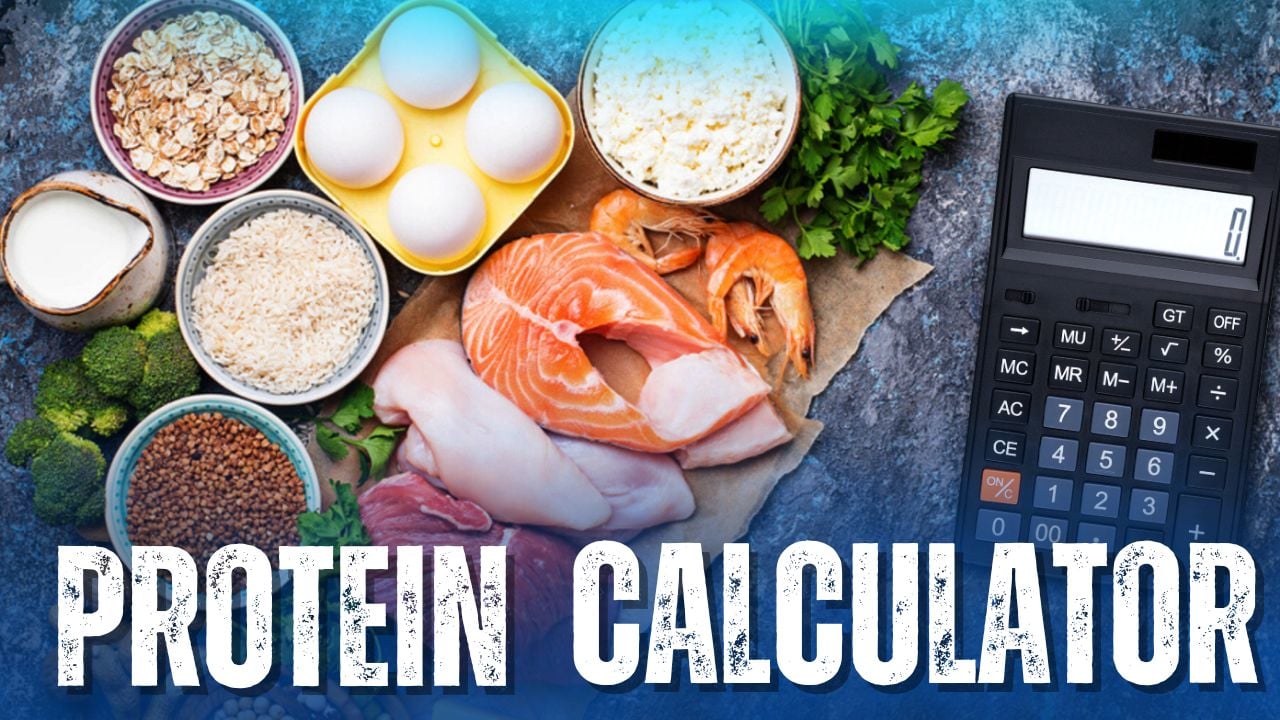Protein Intake Calculator & Meal Planner
Professional-grade protein calculations with AI meal planning, supplement guidance, and comprehensive protein source recommendations

Protein Intake Calculator: Evidence-Based Nutrition Planning
Advanced Protein Requirements Calculator
Our protein intake calculator uses scientifically validated formulas to determine your optimal daily protein requirements. Based on extensive research from sports nutrition experts and health organizations, this tool provides personalized recommendations that account for your age, gender, weight, activity level, and specific fitness goals.
Unlike basic protein calculators that use generic recommendations, our advanced system considers multiple factors including metabolic demands, training intensity, and recovery needs to deliver precise protein targets that support your health and performance objectives.
Scientific Foundation
The calculator incorporates recommendations from leading nutrition research institutions including the International Society of Sports Nutrition (ISSN), American College of Sports Medicine (ACSM), and peer-reviewed studies on protein metabolism. Our algorithms are regularly updated to reflect the latest scientific consensus on optimal protein intake for various populations.
Understanding Protein Requirements
Individual Factors
- Body Weight and Composition: Lean body mass is the primary determinant of protein requirements
- Age: Protein needs increase with age due to decreased protein synthesis efficiency
- Gender: Differences in muscle mass and hormonal profiles affect protein utilization
- Activity Level: Physical activity significantly increases protein requirements for recovery and adaptation
- Training Type: Resistance training demands higher protein intake than endurance activities
Goal-Specific Requirements
- Muscle Building: 1.6-2.2g per kg body weight for optimal muscle protein synthesis
- Weight Loss: 1.2-1.6g per kg to preserve lean mass during caloric restriction
- Athletic Performance: 1.2-2.0g per kg depending on sport and training phase
- General Health: 0.8-1.2g per kg for basic physiological functions
- Recovery: Higher intake supports tissue repair and immune function
Protein Quality and Timing Strategies
Protein Quality Factors
Not all proteins are created equal. The biological value of protein sources depends on their amino acid profile, particularly the content of essential amino acids that the body cannot synthesize. Complete proteins contain all nine essential amino acids in optimal ratios.
Optimal Timing Protocols
Research shows that protein timing can significantly impact muscle protein synthesis and recovery. The anabolic window concept has evolved from strict post-workout timing to a more flexible approach emphasizing total daily intake distribution.
Age-Specific Protein Recommendations
Recommended Daily Protein Intake by Age Group
Based on Dietary Reference Intakes (DRI) and current research on protein metabolism across the lifespan
| Age Group | RDA (g/kg/day) | Active Individuals (g/kg/day) | Special Considerations |
|---|---|---|---|
| Children (4-8 years) | 0.95 | 1.0-1.2 | Growth and development |
| Adolescents (9-18 years) | 0.85 | 1.2-1.6 | Peak growth velocity |
| Adults (19-50 years) | 0.8 | 1.2-2.2 | Activity and goal dependent |
| Older Adults (51+ years) | 1.0-1.2 | 1.2-1.6 | Sarcopenia prevention |
| Pregnant Women | 1.1 | 1.2-1.5 | Fetal development |
| Lactating Women | 1.3 | 1.5-1.8 | Milk production |
Health Benefits of Optimal Protein Intake
Metabolic Health
- Thermic Effect: Protein has the highest thermic effect of all macronutrients, increasing energy expenditure by 20-30%
- Satiety: Enhanced satiety hormones (GLP-1, CCK) reduce overall caloric intake
- Blood Sugar Control: Protein helps stabilize blood glucose levels and improve insulin sensitivity
- Metabolic Rate: Adequate protein preserves metabolic rate during weight loss
Body Composition
- Muscle Preservation: Prevents muscle loss during caloric restriction and aging
- Muscle Growth: Provides amino acids for muscle protein synthesis
- Bone Health: Supports bone mineral density and reduces fracture risk
- Recovery: Accelerates tissue repair and reduces exercise-induced muscle damage
Immune Function
- Antibody Production: Essential for immunoglobulin synthesis
- Wound Healing: Critical for tissue repair and regeneration
- Enzyme Function: Many enzymes are proteins essential for cellular processes
- Antioxidant Activity: Supports endogenous antioxidant enzyme production
How to Use the Protein Calculator
Select Measurement System
Choose between metric (kg/cm) or imperial (lbs/ft) units based on your preference. The calculator automatically converts between systems to ensure accurate calculations regardless of your input format.
Enter Personal Information
Input your age (15-100 years), gender, current weight, and height. These fundamental measurements form the basis for calculating your baseline protein requirements and metabolic demands.
Select Activity Level
Choose your activity level from sedentary to extremely active. This factor significantly impacts your protein needs, with more active individuals requiring higher intake to support recovery and adaptation.
Define Your Goals
Select your primary objective: muscle gain, weight loss, athletic performance, or general health maintenance. Each goal requires different protein intake strategies for optimal results.
Get Personalized Results
Receive detailed protein recommendations including daily targets, per-meal distribution, and timing strategies. Access additional tools for meal planning, supplement guidance, and protein source recommendations.
Scientific Research and References
International Society of Sports Nutrition Position Stand
Comprehensive review of protein requirements for athletes and active individuals, establishing evidence-based recommendations for optimal intake and timing.
Read Full StudyProtein Requirements and Aging
Research examining increased protein needs in older adults for maintaining muscle mass and preventing sarcopenia, with recommendations for optimal intake levels.
View ResearchProtein and Weight Management
Meta-analysis of protein’s role in weight loss and weight maintenance, demonstrating the benefits of higher protein intake for body composition.
Access StudyMuscle Protein Synthesis and Exercise
Investigation of post-exercise protein requirements and timing for maximizing muscle protein synthesis and adaptation to training.
Read ResearchDietary Protein and Metabolic Health
Comprehensive review of protein’s effects on metabolism, satiety, and overall health outcomes across different populations.
View PublicationProtein Quality and Amino Acid Requirements
Analysis of protein quality factors and essential amino acid requirements for optimal health and performance outcomes.
Access ResearchFrequently Asked Questions
Daily protein requirements vary based on individual factors including age, weight, activity level, and goals. The general recommendation ranges from 0.8g per kg body weight for sedentary adults to 2.2g per kg for athletes and those building muscle. Our calculator provides personalized recommendations based on current research.
While total daily protein intake is most important, timing can optimize results. Aim for 20-40g of protein every 3-4 hours throughout the day. Post-workout protein within 2 hours supports recovery, and pre-sleep protein (20-30g) can enhance overnight muscle protein synthesis.
For healthy individuals, protein intakes up to 2.5g per kg body weight are generally safe. However, extremely high protein intake may stress the kidneys in those with pre-existing kidney disease. It’s important to maintain a balanced diet and consult healthcare providers for specific medical conditions.
Plant proteins can be just as effective when consumed in adequate amounts and proper combinations. While some plant proteins lack certain essential amino acids, combining different plant protein sources (like rice and beans) creates complete amino acid profiles comparable to animal proteins.
Protein supplements are convenient but not necessary if you meet your daily protein needs through whole foods. They can be beneficial for athletes, those with high protein requirements, or individuals with limited time for meal preparation. Whole food sources provide additional nutrients beyond protein.
Protein requirements generally increase with age due to decreased protein synthesis efficiency and increased risk of muscle loss (sarcopenia). Adults over 65 may need 1.0-1.2g per kg body weight compared to 0.8g per kg for younger adults, with higher amounts beneficial for maintaining muscle mass.
Medical Disclaimer
This protein calculator is designed for educational and informational purposes only. The recommendations provided are based on general population guidelines and current research. Individual protein needs may vary based on medical conditions, medications, and other factors. Always consult with a qualified healthcare provider or registered dietitian before making significant changes to your diet, especially if you have kidney disease, liver problems, or other medical conditions. This tool does not replace professional medical advice, diagnosis, or treatment.
Copy Your Protein Plan:
`); }); } } generatePlanText() { return `MY PROTEIN PLAN ===================================== 💪 DAILY PROTEIN TARGETS • Target: ${this.currentResults.daily}g • Range: ${this.currentResults.min}-${this.currentResults.max}g • Per kg body weight: ${this.currentResults.perKg}g/kg • Per meal: ${this.currentResults.perMeal}g • Per snack: ${this.currentResults.perSnack}g 🔥 From protein: ${this.currentResults.calories} calories 💡 Generated by Protein Calculator Visit: ${window.location.href} `; } generatePlanHTML() { return `💪 My Protein Plan
Generated on ${new Date().toLocaleDateString()}
📊 Daily Protein Targets
Related
- Weight Loss Calculator: Free Deficit Calorie Calculator
- Mifflin-St Jeor: Equation & Calculator
- Total Daily Energy Expenditure (TDEE) Calculator
- Advanced Macro Calculator with Custom Meal Plans
- Zumba Calories Burned Calculator
- Pull Up Calories Burned Calculator
- Push-Up Calories Burned Calculator
- Home Activities Calories Burned Calculator
- Exercise Calories Burned Calculator
- Running Calorie Calculator
- Walking Calorie Burned Calculator

Manish is a NASM-certified fitness and nutrition coach with over 10 years of experience in weight lifting and fat loss fitness coaching. He specializes in gym-based training and has a lot of knowledge about exercise, lifting technique, biomechanics, and more.
Through “Fit Life Regime,” he generously shares the insights he’s gained over a decade in the field. His goal is to equip others with the knowledge to start their own fitness journey.
